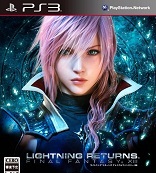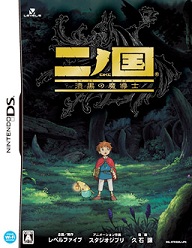« Various RPG scans 12/11 | Main | Final Fantasy XIII battle, menu screenshots »
The Pressure is on Final Fantasy XIII
By Heath | December 13, 2009 at 12:42 am
And the time is almost upon us. The time for the generation’s first main-series Final Fantasy title. The time, gaming brethren, for beginning sentences — nay, entire articles — with conjunctions. We’re at a rare juncture in history. For the first time in eight years, Final Fantasy is making the jump to a new generation. The pressure is on Final Fantasy XIII.
Let it be known right off the bat that this is not a piece on my opinions, but expressing my interest in the situation and why I find it interesting. These are lists of facts, general consensus evaluations, and musings, not praise or bashing. I’m not trying to convince you of anything, either. Just bringing to light some things many have probably not realized about what’s going on.
With every Final Fantasy release comes unrealistic amounts of pressure from all corners of the world except ####hole corners of the world that don’t have video games. (Very minimal pressure is coming from Uganda.) But there is a special kind of pressure that falls upon the series’ generational gatekeepers. These are the ones that set the tone, that make the example, that (at least attempt to) raise the bar for future installments. If successful (I don’t just mean financially, though that certainly helps), they have a way of locking up the fanbase for another generation.

The first Final Fantasy is kind of hard to count since it had, well, no predecessors. Even so, Sakaguchi and company put together the onscreen adaptation of a few pencil-and-paper RPG mechanics, a pinch of Dragon Quest, a Uematsu soundtrack and other ingredients that would become series staples to create an experience lauded by gamers the world over. What makes the first game a little more retrospectively interesting, however, is that parts II and III would not be localized abroad. It would be the next generational usher, Final Fantasy IV, that would return the series to its English-speaking audience.

Final Fantasy IV (Orignally II in North America)
Brought to the series: Focus on story and characters, expected graphical upgrade.
Helped the business and/or franchise? Yes.
And Final Fantasy IV did a fine job of making the generational leap. (Note: throughout this piece, I’m not really dropping my opinions on the games themselves, but how good of a job they did in welcoming a new generation. Just that. Don’t go try to blast me with piss, haters.) Graphics are not the most important aspect of an RPG, and in many cases might not matter at all, but when they look good, it’s a nice bonus at the very least. But FFIV‘s raising of the bar didn’t stop at meeting the expected visual boost that comes with superior hardware. Many look back to FFIV as the game that really opened the floodgates for story-driven RPGs. Pizza enthusiast Jake Alley once called it “the birth of the story-driven game.”
Its proper setting of the tone is not undermined by Final Fantasy V going the way of II and III. FFV’s initial lack of localization had nothing to do with how well the team did with bringing IV into the new age. Fact is, the develoeprs continued to run with what had been started in the previous game.
In Final Fantasy VI as well, Square continued to work with the new level that had been established with IV and continued in V. The bar could be lifted gradually thanks to that initial dive into the generation being successful.
If the series’ first title had been the consensus crapfest Final Fantasy II and the first shot at the 16-bit era had been V, which many feel to be the weakest of the 16-bit FFs, would the series have had a bit more difficulty. First impressions being as important as they are in human behavior, there’s reason to believe so.

Final Fantasy VII
Brought to the series: Cinematic direction, changing facial expressions (in CG story sequences), 3D battles and world map (not just in the airship), enhanced music quality.
Helped the business and/or franchise? Yes.
After that, eyes were on Final Fantasy VII. Once again Final Fantasy would have to make a transition into a new generation, and even a new medium (CD instead of cartridge). How would it be handled? Squaresoft knocked one out of the park with Final Fantasy VII; again, love the game or hate the game, the game brought the series into the 32-bit era with fireworks. Plenty would argue that in terms of marketability, it was even the ambassador for the genre as a whole. The ante was most certainly upped, as the game, despite blocky characters that many find laughable today, featured CG cinemas the level of which the series (and most games in general at that time) hadn’t come close to. It has often been compared to the 16-bit titles, with the characters having their set animations . This is not to say it was the ideal RPG or even the ideal PlayStation RPG (though many feel so). This is simply a note that Square successfully paved the way onto a new platform. It was a fine first for its generation. It brought in huge cash, it grew the fanbase tremendously, and was a huge step in making Final Fantasy the household name it is today.
Four years later, the PlayStation 2 arrived and Square had to prepare again to impress its growing — and in some cases, dumbing — fanbase. In 2001, Final Fantasy X hit the scene, and despite its hand-holding linearity, wound up largely captivating its audience. Its atmosphere, visuals, and series-first use of voice acting worked in its favor, and again would stand as a positive message about what was to come. But this is where things get tricky. All of these previous Gatekeepers and Keymasters were not developed by Square Enix; they were developed by Squaresoft.
Final Fantasy X
Brought to the series: Voice acting, visual improvements beyond expectations.
Helped the business and/or franchise? Yes.
Final Fantasy X brought the series to a then-new generation some eight years ago. After a company merger, personnel shakeups and a whole slew of remakes, spinoffs, sequels, and ports, millions are wondering how well Final Fantasy XIII will properly welcome the series into the current generation. Speculation abounds about other RPG series having overtaken Square’s (or rather, Square Enix’s) flagship in terms of being the technological leader in the genre. Apart from that, eight years is a long time, and there are worries about the company’s ability to please those that have grown up with the series and those that are new to it as well. Obviously, no game will please everyone, but if a generation’s first outing is poorly received, it might perhaps be the first step in the epic fall of a mighty giant.
This worry is fueled by the brutally low 39/40 shellacking from Famitsu, which has been the talk of the town. Apparently Square Enix lacked the financial resources to buy the proper review.
Final Fantasy XIII will be the first main-series FF for a whole mess of people. It will be interesting to see how they take it.
Of course only time will tell whether or not Final Fantasy XIII proves a good first step into the current generation. Will it be the first step toward a decline, or will the series once again bust out just enough of the right stuff at this most critical time? We can’t yet know, but as general RPG fans, we’re quite interested to see how this all plays out.
Relevant links:
Remembering the RPGs of 2001
Final Fantasy XIII massive preview
Hands-on Final Fantasy XIII (Tokyo Game Show impression) by Janelle
Topics: Editorials, Final Fantasy XIII, History of...










